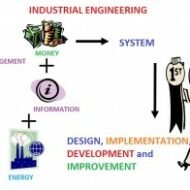Posted by Managementguru in Business Management, Entrepreneurship, Labor Management, Operations Management, Principles of Management
on Mar 31st, 2014 | 0 comments

Operations Research-Emphasizing the need of Math in Management Business is all about “demand versus supply”. And as is always the case, industries operate in a tight situation, with limited resources and heavy demand, trying to make the ends meet. The production of required quantity with the available resources needs an approach that is quantitative and logical as well. This can be obtained by weighing the odds and choosing the right kind of decision that suits your business plan, be it production, distribution, marketing, selling or any business situation, where there is a need to compare and contrast between alternating decisions, to arrive at an optimal solution. High end mathematical concepts in Operations: Operations research comes into the picture in such situations, wherein, high end mathematical concepts and models are applied to problem situations, to first define the problem and then extract the best possible solution by quantifying the resources available. Quantitative data is then converted into linear equations to maximize the productivity and profit. Profit maximization is generally aimed by most of the firms that operate with limited potential and operations research helps to achieve this through optimal use of the available resources. Application of Scientific Methods: The emphasis is on application of scientific methods, use of quantitative data, goals and objectives and determination of the best means to reach them. Once the data is collected, it is carefully evaluated and the relationship among data is established, which helps in defining the problems and goals. The problem is represented logically to decide the course of action. Say, for example, Linear Programming represents each and every problem situation in the form of a linear equation and tries to allocate resources in an optimal fashion. Alternate decisions are evaluated and the decision that yields the best result in terms of productivity and profit is considered. Measure of Effectiveness: How do you measure profit? The measure of effectiveness will be determining the rate of return on investment, and every possible solution can be weighed against this measure. Theories of probability are also used to predict the success rate of the combinations of variables executed in different ways. But one has to understand that only some variables are controllable and others are not. Say, if the economy experiences inflation or recession, your predictions will undergo a drastic review in purview of the fluctuations in the economy. Similarly availability of labor is always a constraint, either labor is not available or they demand more pay. Simplex Methods: Since voluminous data is involved, computers with multi processors are used to manipulate the data. Mathematical tools like simplex methods, integer programming, graphical methods, transportation and assignment techniques, simulations, game theory and queuing theory can be very well applied to solve complex problem situations with ease. Today’s business world demands more sophistication in terms of technical updations. Evolution of Opeartions Research Techniques: Operations Research dates back to the Second World War period, and the accelerated growth of this discipline in recent years can be attributed to the fact that, researchers have found this useful in solving economic and political problems too. At the same time, critics point out that, application of operations research proves advantageous only to those people who are accustomed to the usage of rapid computing machines and understand the complex mathematical formulae and relationships. Note: Energy: The oil industry was one of the earlier users of operations research techniques to help manage their refinery processes, and operations research technologies are heavily used by all the major oil companies. Manufacturing: Manufacturing organizations continue to use operations research to optimize factory operations. Transportation: Operations researchers execute logistics for air traffic control, trucking, and railroads. Real-time dispatching and delivery truck...

Posted by Managementguru in Labor Management, Operations Management
on Feb 23rd, 2014 | 0 comments

What is Operations Management and Why is it Important? Operation is that part of as organization, which is concerned with the transformation of a range of inputs into the required output (services) having the requisite quality level. Management is the process, which combines and transforms various resources used in the operations subsystem of the organization into value added services in a controlled manner as per the policies of the organization. The set of inter-related management activities, which are involved in manufacturing certain products, is called as production management. If the same concept is extended to services management, then the corresponding set of management activities is called as operations management. What is Production? Production is defined as ‘the step-by-step conversion of one form of material into another form through chemical or mechanical process to create or enhance the utility of the product to the user’. Thus production is a value addition process. At each stage of processing, there will be value addition. Pic Courtesy: Minds.com Edwood Buffa defines production as ‘a process by which goods and services are created’. Some examples of production are: manufacturing custom-made products like, boilers with a specific capacity, constructing flats, some structural fabrication works for selected customers, etc., and manufacturing standardized products like, car, bus, motor cycle, radio, television, etc. Characteristics of a Production System 1. Production is an SYSTEMATIZED activity, so every production system has an objective. 2. The system transforms the various inputs to useful outputs. 3. It WORKS IN TANDEM with the other organisation systems. 4. There exists a feedback about the activities, which is essential to control and improve system performance. Evolution of Production Management Why Operations Management is Important? Increases productivity of every organization Leads to economic growth and development Helps employees to receive high wages Earns profit for a company Also plays a strategic role in a firm’s competitive success Want to Learn Some Interesting Operations Management Terms? Capacity planning—The process of determining the production capacity needed by an organization to meet changing demands for its products. Different types of capacity exist. For example, design capacity is the maximum amount of work that an organization is capable of completing in a given period; effective capacity is the maximum amount of work that an organization is capable of completing in a given period due to constraints such as quality problems, delays, and material management. Efficiency—Performing activities at the lowest possible cost. Enterprise resource planning (ERP)—Large, sophisticated software systems used for identifying and planning the enterprise-wide resources needed to coordinate all activities involved in producing and delivering products. Forecasting—The process of predicting future events, including product demand. Just-in-time—A philosophy designed to achieve high-volume production through elimination of waste and continuous improvement. Lean systems—Sometimes synonymous with just-in-time, it is a philosophy that takes a total system approach to creating efficient operations through the elimination of waste. Location analysis—Identifying the best location for facilities. Mass customization—The ability of a firm to highly customize its goods and services at high volumes through its operations management function. Product design—The process of deciding on the unique and specific features of a product. Process selection—The process of identifying the unique features of the production process that will give the product its unique characteristics. Process selection typically goes hand in hand with product design, as we need to create a process that gives rise to the particular product design desired. An excellent product design is worthless if a process for its creation cannot be developed. Productivity—A measure of how efficiently an organization converts inputs into outputs. It is usually measured by a ratio of output divided by input. Productivity is essentially a scorecard of how efficiently resources are used and a measure of...




